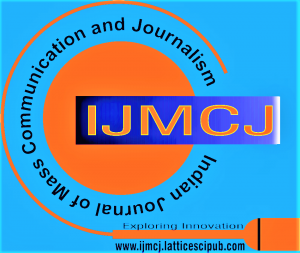![]()
Evaluating the Impact of Fake News on Intolerance Among Socio-Economic Classes 3 & 4
Krishna Mohan Sharma
Dr. Krishna Mohan Sharma, Department of Mass Communication, Editor- Bharat Express, Noida (Uttar Pradesh), India
Manuscript received on 21 March 2025 | First Revised Manuscript received on 05 April 2025 | Second Revised Manuscript received on 20 May 2025 | Manuscript Accepted on 15 June 2025 | Manuscript published on 30 June 2025 | PP: 21-25 | Volume-4 Issue-4, June 2025 | Retrieval Number: 100.1/ijmcj.D112604040625 | DOI: 10.54105/ijmcj.D1126.04040625
Open Access | Editorial and Publishing Policies | Cite | Zenodo | OJS | Indexing and Abstracting
© The Authors. Published by Lattice Science Publication (LSP). This is an open-access article under the CC-BY-NC-ND license (http://creativecommons.org/licenses/by-nc-nd/4.0/)
Abstract: The proliferation of fake news in the social media era has significant consequences for individuals, society, and democratic processes. Research has highlighted the detrimental effects of fake news on various aspects of society, including public opinion, political discourse, and individual decisionmaking. One consequence of fake news is the erosion of public trust in media and institutions. The finding reveals that fake news spreads much faster than credible information. This is a dangerous finding because, at best, fake news can spread false hope, and at worst, it can flare hatred and incite violence. A total of 100 cases of violations of religious hate speech were identified from the media studied in this research between 2022 and 2023. Regarding the religion involved in the cases, the Islamic denomination was predominant (32%), followed by Hindus (28%) and Catholicism (20%). Hate speech and incitement to violence were the most common topics (30%), although acts of discrimination and rejection (26%) and material damage or attacks on places of worship (19%) were also reported. The finding suggests that higher education students do not want to send fake news when they broadcast information. The finding also reveals that higher education students belong to many groups, and this does not affect the number of fake news stories because students conduct advanced research on the news and verify if it has a reliable source. Findings suggest that fake news and disinformation can subtly influence emotions and attitudes, potentially leading to behavioural consequences. The findings of the studies show that economic inequality is a potent enhancer of intolerance, inducing the escalation of out-group discrimination even without the presence of new intolerant mutants. Tolerance is positively associated with national-level economic prosperity, and this relationship is stronger for higher-income earners than for those with lower incomes. Individuals with job market insecurity and lower economic status (i.e., low income) are more likely to be more intolerant of people with different faiths. Once intolerance begins to act, it is almost unstoppable in the presence of inequality. The relationship between socioeconomic status, Misinformation, and intolerance is significant, as individuals from lower SES backgrounds are often at a higher risk of engaging in violent behaviour due to factors like poverty, lack of access to education, and limited economic opportunities. Lower family incomes of 30-60 K are more vulnerable to intolerance. Studies have shown a potential link between lower socioeconomic status (SES) and higher levels of intolerance, suggesting that individuals from lower socioeconomic backgrounds may be more likely to exhibit intolerance towards others, particularly when facing economic hardship or perceived threats from different groups; Digital media has also made it easier to spread misinformation that is many a times unverifiable. While name-calling, fake news, and other forms of low-level discourse and unethical political communication have always existed, social media has undoubtedly exacerbated these problems to a new level. The relationship between socioeconomic status, Misinformation, and intolerance is significant, as individuals from lower SES backgrounds are often at a higher risk of engaging in violent behaviour due to factors like poverty, lack of access to education, and limited economic opportunities.
Keywords: Social Media, Individuals, Society, Public Opinion, Political Discourse, Hate Speech.
Scope of the Article: Emerging Trends in Journalism
